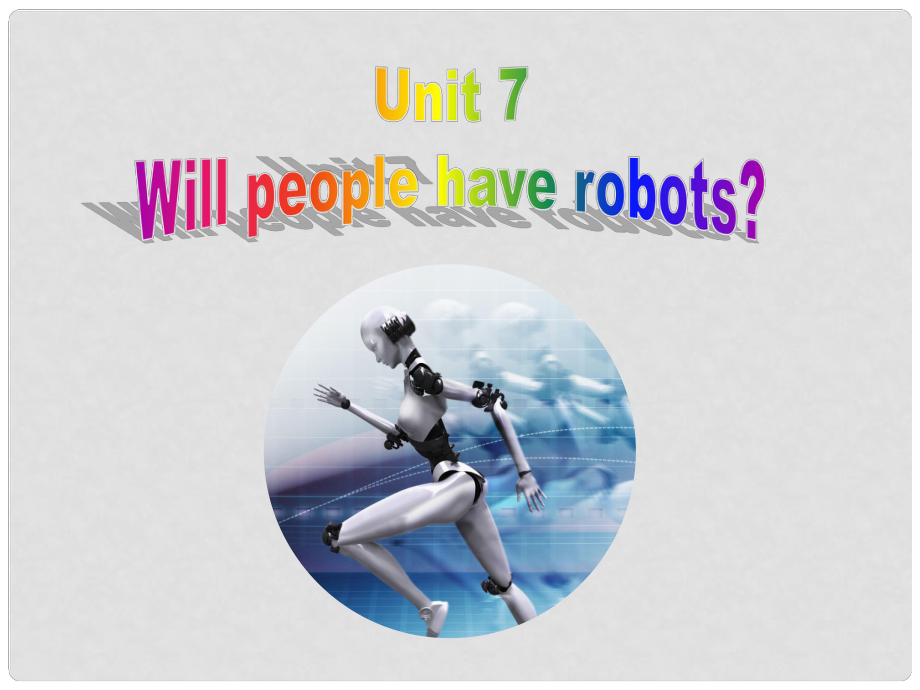《河北省邢臺市橋東區(qū)八年級英語上冊 Unit 7 Will people have robots Section B1課件 (新版)人教新目標(biāo)版》由會(huì)員分享��,可在線閱讀����,更多相關(guān)《河北省邢臺市橋東區(qū)八年級英語上冊 Unit 7 Will people have robots Section B1課件 (新版)人教新目標(biāo)版(32頁珍藏版)》請?jiān)谘b配圖網(wǎng)上搜索。
1��、Section BPeriod OneTell something about the future with more, less or fewer. There will be more cars. There will be fewer jobs for people because more robots will do the same jobs as people.People will have more free time because there will be less work to do. 招聘會(huì)現(xiàn)場招聘會(huì)現(xiàn)場New words1a Write each word i
2��、n the correct column below.astronaut house apartment trainrocket space station computer programmerJobsTransportationPlaces to liveastronaut computer programmertrain rockethouseapartment space station1b Think of other words and write them in the chart in 1a.JobsTransportationPlaces to liveastronaut c
3��、omputer programmertrain rockethouseapartment space stationrobot cleanersuper policemanspace shiphelicopter(直升機(jī))直升機(jī))flat(公寓公寓) shelter(避難所避難所)1c Listen to Alexis and Joe. Number the pictures 1-3.2311d Listen again. Fill in the blanks with the correct verbs in the box.1. I live in an apartment across
4��、the street from here.2. I _ near here.3. I _a computer programmer.am live work lived took will be will live will flyworkam4. We in a house in the country.5. I the train to school.6. I an astronaut.7. I rockets to the moon.8. I on a space station.livedwill bewill fly tookwill live聽力原文聽力原文一般過去時(shí)一般過去時(shí) 基
5�、本構(gòu)成基本構(gòu)成:v-ed用法:用法:1)在確定的過去時(shí)間里所發(fā)生的)在確定的過去時(shí)間里所發(fā)生的 動(dòng)作或存在的狀態(tài)。動(dòng)作或存在的狀態(tài)���。 2)表示在過去一段時(shí)間內(nèi)���,經(jīng)常)表示在過去一段時(shí)間內(nèi),經(jīng)常 性或習(xí)慣性的動(dòng)作�。性或習(xí)慣性的動(dòng)作。時(shí)間狀語有時(shí)間狀語有:yesterday, last week, an hour ago, the other day, in 1982等��。等。Where did you go just now?時(shí)態(tài)比對時(shí)態(tài)比對一般現(xiàn)在時(shí)的用法一般現(xiàn)在時(shí)的用法用法:用法:表示經(jīng)常性或習(xí)慣性的動(dòng)作��,表示經(jīng)常性或習(xí)慣性的動(dòng)作����,常與表示頻度副詞的時(shí)間狀語連用����。常與表示頻度副詞的時(shí)間狀語連用
6、���。 時(shí)間狀語:時(shí)間狀語: every, sometimes,at, on SundayI leave home for school at 7 every morning.一般將來時(shí)的用法一般將來時(shí)的用法 基本構(gòu)成:基本構(gòu)成:be going to/will/shall+動(dòng)詞動(dòng)詞原形原形 用法:用法:表示將來的動(dòng)作或狀態(tài)表示將來的動(dòng)作或狀態(tài) 時(shí)間狀語:時(shí)間狀語:tomorrow(明天)����,(明天)�, next week(下(下周),周)��, from now on(從現(xiàn)在開始)�;(從現(xiàn)在開始);in the future(將來)等�。(將來)等。 1e Student A is Alexis and
7�、 Student B is Joe. Talk about Joes life now, 10 years ago and 10 years from now.A: Where do you live?B: I live in an apartment.A: Where did you live 10 years ago?B: I lived in Greenville.A: How did you get to school?B: I took the train to school.10 years agoA: what will your life be like in 10 years
8、?B: Oh, I think Ill be an astronaut.A: Where will you live in 10 years?B: I will live on a space station.In 10 years2a Tell your partner what you know about robots. What do they look like and what can they do?What do they look like?They look like humans.They look like snakes.What does it look like?I
9、t looks like a dog. This robot looks like a huge arm.What can the robots do?speakdo exercise run cookplay the pianoThere are some other robots, what can they do ?Play footballdanceWhat can it do ?Explore(探險(xiǎn)探險(xiǎn)) the universe(宇宙)(宇宙)What can robots do?shapeshumanssnakehuge arm dog do homeworkplay with
10����、people play footballlook for peopledo unpleasant jobswalk and dancetalk 單項(xiàng)選擇單項(xiàng)選擇 1.The next time you see Nikos, he _ sixteen years old. A. will be B. is C. was D. will 2.Tom _computer science last year. A. studies B. studied C. will study D. is studying 3.In ten years, John_ an astronaut. A. is B. w
11、ill be C. was D. will ABB4. How many people_ there fifty years ago? A. will B. were C. are D. will be 5. In AD 20 000,what_the world be like? A. is B. will C. was D. are 6.There is_ meat but_ cakes on the plate. Please have one. A. a little; a few B. a few; a little C. few; little D. little; a few BBD
 河北省邢臺市橋東區(qū)八年級英語上冊 Unit 7 Will people have robots Section B1課件 (新版)人教新目標(biāo)版
河北省邢臺市橋東區(qū)八年級英語上冊 Unit 7 Will people have robots Section B1課件 (新版)人教新目標(biāo)版

